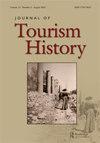“养尊处优的寻欢作乐者寻求的游戏”:1910年至1940年加拿大育空地区的狩猎旅游、保护和殖民主义
IF 0.9
Q4 HOSPITALITY, LEISURE, SPORT & TOURISM
引用次数: 1
摘要
摘要本文考察了1910年至1940年加拿大育空地区狩猎旅游的兴起,特别关注狩猎旅游与野生动物监管和殖民地化的交叉方式。随着运动狩猎变得更加有利可图,育空地区内外的支持者都主张加强野生动物监管,并采用北美保护伦理。1920年,育空地区政府对《育空狩猎条例》进行了重大修订,对土著人的生活方式产生了重大影响。受殖民主义野生动物意识形态的影响,《游戏条例》法规的修改使育空第一民族在经济上处于不利地位,并有可能破坏他们的生存生活方式。在这一时期,体育猎人、大型比赛向导和服装商、政府官员、原住民和殖民地特工都在讨论保护的目的和野生动物监管的现实。育空地区狩猎旅游的历史符合旅游业、保护和殖民主义交叉点的更广泛历史,表明了关于野生动物和保护的殖民意识形态有利于自然世界的娱乐用途,同时削弱了土著人的生存和市场狩猎,在育空地区,将原住民推向了新旅游经济的边缘。本文章由计算机程序翻译,如有差异,请以英文原文为准。
‘Game which the pampered pleasure seekers seek’: hunting tourism, conservation, and colonialism in the Yukon Territory, Canada, 1910–1940
ABSTRACT This article examines the rise in popularity of hunting tourism in the Yukon Territory, Canada from 1910 to 1940 with particular attention to the ways in which hunting tourism intersected with wildlife regulation and colonisation. As sport hunting became more profitable, proponents both within and outside of the Yukon argued for increased wildlife regulation and the adoption of a North American conservation ethic. In 1920 the Yukon Territorial Government significantly amended the Yukon Game Ordinance in ways that created significant impacts on Indigenous ways of life. Changes to Game Ordinance regulations, influenced by colonial ideologies about wildlife, economically disadvantaged Yukon First Nations and threatened to undermine their subsistence lifestyles. Throughout this period, sport hunters, big game guides and outfitters, government officials, First Nations, and colonial agents all debated the purpose of conservation and the lived realities of wildlife regulation. This Yukon history of hunting tourism fits within broader histories at the intersection of tourism, conservation, and colonisation and demonstrates the ways that colonial ideologies about wildlife and conservation have favoured recreational uses of the natural world while undercutting Indigenous subsistence and market hunting and, in the Yukon, pushed First Nations to the margins of this new tourism economy.
求助全文
通过发布文献求助,成功后即可免费获取论文全文。
去求助
来源期刊

Journal of Tourism History
HOSPITALITY, LEISURE, SPORT & TOURISM-
CiteScore
0.60
自引率
0.00%
发文量
16
期刊介绍:
The Journal of Tourism History is the primary venue for peer-reviewed scholarship covering all aspects of the evolution of tourism from earliest times to the postwar world. Articles address all regions of the globe and often adopt interdisciplinary approaches for exploring the past. The Journal of Tourism History is particularly (though not exclusively) interested in promoting the study of areas and subjects underrepresented in current scholarship, work for example examining the history of tourism in Asia and Africa, as well as developments that took place before the nineteenth century. In addition to peer-reviewed articles, Journal of Tourism History also features short articles about particularly useful archival collections, book reviews, review essays, and round table discussions that explore developing areas of tourism scholarship. The Editorial Board hopes that these additions will prompt further exploration of issues such as the vectors along which tourism spread, the evolution of specific types of ‘niche’ tourism, and the intersections of tourism history with the environment, medicine, politics, and more.
 求助内容:
求助内容: 应助结果提醒方式:
应助结果提醒方式:


